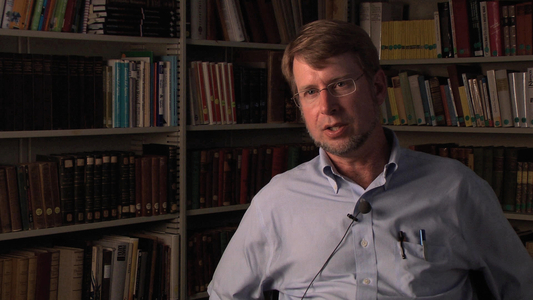Mark Louden
Item Information
- Title:
- Mark Louden
- Description:
-
Mark Louden, Professor of Linguistics in the Department of German at the University of Wisconsin at Madison, was interviewed by Allie Brudner on March 21, 2012 at the University of Wisconsin, Madison. Professor Louden is one of a small number of non-Jewish Yiddish experts. Louden grew up in Oakland, California, and was exposed to Jewish culture and Yiddish through friends’ families and his parents’ friends. A self-described “language kid,” he recognized the connection between Yiddish and German, which he had begun to learn, and became interested enough to start teaching himself Yiddish as an undergraduate at Cornell University. At Cornell he also learned Pennsylvania Dutch and recognized the similarities and parallels among the three languages. He became interested in Yiddish as a vernacular language and particularly in studying how people actually talk. His research in this regard is similar to the research of Henry Sapoznik, an award-winning Yiddish musicologist. Following his undergraduate and graduate work at Cornell University (Ph.D. 1988), he was appointed to the Linguistics Department at the University of Texas in Austin. There he met Itzik Gottesman, who became his mentor, and it was from Gottesman that he learned yiddishkeit (Jewishness). Gottesman, an American-born, native speaker of Yiddish, is a Yiddishist and folklorist. Through Gottesman, Louden became interested in the intersection of language and culture. Together they explored Jewish and Yiddish culture and history in Texas, which focuses on the descendants of 19th century German, Yiddish-speaking immigrants. Language and its relationship to culture remains Louden’s focus. Louden views Yiddish as a vehicle for understanding cultural expression and as marker of cultural identity. He considers language an identifier, an agent of cultural maintenance, and a way to connect with human beings and enter a portal to a different culture. According to Louden, Yiddish acts as “social glue” and makes you a member of the “club” for secular or non-Jews. He believes that Yiddish helps us understand a slice of life in multi-cultural Europe and America. He is interested, for example, in the varieties of Yiddish spoken in different places and what that tells us about the variations of culture in those places. Rather than a “revival” of Yiddish, which, according to Louden, has been and is being maintained by the Hasidic communities, Louden views current learning as a new chapter in the book of Yiddish, connected to, but transcending, Jewish Studies. He views transmission of language as an important role for academics, and believes academics must convey passion for the language while simultaneously making it accessible for non-specialists. He has found that younger students don’t have the historical hang-ups with Yiddish that older generations had. They are always interested, he states, when he identifies English words or phrases that come from Yiddish, such as “boo-hoo” and “the bottom line.” Louden regularly engages in community outreach and thinks being a non-Jew in a Yiddish world is generally viewed as a point of endearment for his Jewish audiences. Louden believes the future of Yiddish is growing and bright because of the increased interest in both the academy and in areas of public outreach: theaters, KlezKamp, Jewish community centers, and the Yiddish Book Center. He notes that while Yiddish is easier to learn for German speakers, he has found that English speakers can develop reasonable proficiency relatively easily. His advice is to stick with it. To learn more about the Wexler Oral History Project, visit: http://www.yiddishbookcenter.org/tell-your-story To cite this interview: Mark Louden Oral History Interview, interviewed by Allie Brudney, Yiddish Book Center's Wexler Oral History Project, Madison, WI, March 21, 2012. Video recording, http://archive.org/details/MarkLouden21march2012YiddishBookCenter ( [date accessed] )
- Creator:
- Yiddish Book Center (Lily)
- Date:
-
March 21, 2012
- Format:
-
Film/Video
- Location:
- Yiddish Book Center
- Collection (local):
-
Oral Histories
- Subjects:
-
Yiddish Book Center
National Yiddish Book Center
Wexler Oral History Project
Nybc
Ybc
Yiddish
Jewish culture
Advice
Childhood
Yiddish language
Yiddish teaching
Yiddish learning
Yiddish revival and activism
Other languages
Career and Professional Life
Scholarship
Academia
Education
Eastern Europe
Soviet Union
United States
Latin America
Transmission
Assimilation
Purim
Sukkos
Sukkot
Music
Klezmer
Rural
Mark Louden
California
Madison WI
University of Wisconsin Madison
1980s
1990s
2000s
Chassidic
Hasidic
Itzik Gottesman
Texas
German
Oakland CA
Cornell University
Pennsylvania Dutch
Henry Sapoznik
University of Texas
Haredim
Milwaukee
Golda Meir
Manitowoc WI
KlezKamp
- Link to Item:
- https://www.yiddishbookcenter.org/collections/oral-histories/interviews/woh-fi-0000274
- Terms of Use:
-
Rights status not evaluated.
Contact host institution for more information.
- Language:
-
English




